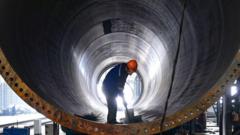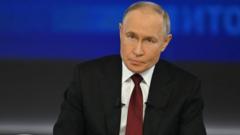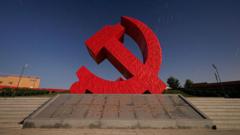China's economy expanded by 4.6% year-on-year in the third quarter, falling short of the government's goal of around 5%, marking the slowest growth since early last year. The National Bureau of Statistics released these figures, revealing a mix of slight unexpected improvements in other sectors, such as retail sales and factory output. However, this continued trend of underperformance raises significant alarm for policymakers.
China's Economic Growth Slows More Than Expected, Raising Concerns

China's Economic Growth Slows More Than Expected, Raising Concerns
Official reports show China's GDP growth has slowed below the government's target, prompting concerns about future economic stability.
The economic outlook appears increasingly precarious, according to Eswar Prasad, a former IMF economist focused on China, who remarked that achieving the growth target for this year is "now in serious jeopardy." This is the second consecutive quarter where the economic growth has not met expectations, intensifying scrutiny over the government's management of economic policies.
Compounding these issues, new home prices in China dropped in September at the fastest rate seen in a decade, indicating a deepening crisis in the real estate sector. Lynn Song, chief economist for Greater China at ING, emphasized that the unsustainable property market is a significant obstacle to broader economic recovery. "We will not see substantial recovery until housing prices stabilize and inventory issues are addressed," she stated.
In response to these troubling trends, China's central bank has urged financial institutions to enhance lending to bolster economic activity. In a historic move last month, the People's Bank of China initiated a comprehensive stimulus package, marking the largest since the pandemic, which included significant cuts to interest and mortgage rates. Furthermore, the Ministry of Finance has introduced additional measures aimed at reviving economic growth amidst persistent challenges such as low consumer and business confidence, and the housing market crisis. As the world's second-largest economy navigates these turbulent waters, the necessity for effective policies and recovery measures will be critical to restore stability and foster growth.
Compounding these issues, new home prices in China dropped in September at the fastest rate seen in a decade, indicating a deepening crisis in the real estate sector. Lynn Song, chief economist for Greater China at ING, emphasized that the unsustainable property market is a significant obstacle to broader economic recovery. "We will not see substantial recovery until housing prices stabilize and inventory issues are addressed," she stated.
In response to these troubling trends, China's central bank has urged financial institutions to enhance lending to bolster economic activity. In a historic move last month, the People's Bank of China initiated a comprehensive stimulus package, marking the largest since the pandemic, which included significant cuts to interest and mortgage rates. Furthermore, the Ministry of Finance has introduced additional measures aimed at reviving economic growth amidst persistent challenges such as low consumer and business confidence, and the housing market crisis. As the world's second-largest economy navigates these turbulent waters, the necessity for effective policies and recovery measures will be critical to restore stability and foster growth.























